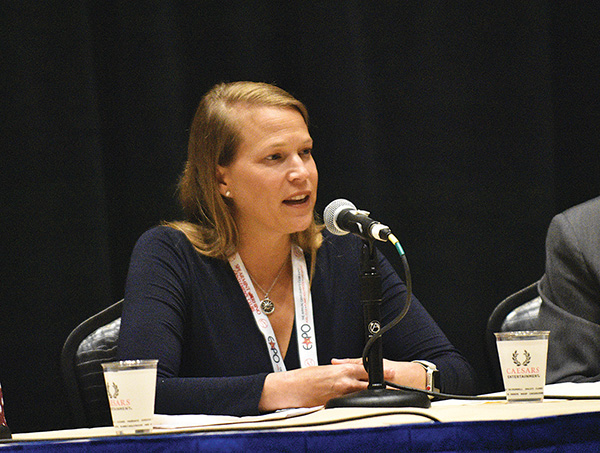Editor’s note: The following article explains the Assembly Bill 5 (aka “AB5”) legislation in California, which has essentially made entertainers employees in that state. The article asks the question, “which state(s) could be next?” New York appears to be following suit (see the following article), and now it seems like New Jersey has joined the fray.
As reported on the late afternoon of Thursday, November 14, New Jersey’s Department of Labor gave Uber a $650 million bill for unemployment and disability taxes, claiming the company is misclassifying drivers as independent contractors. As a Vice article explains, “Other states will likely follow: Like California’s AB5, Massachusetts and New Jersey have strict tests for independent contractor classification, and Oregon and Washington have both fought similar battles over classification. Those developments could cost Uber—a company that has never made a profit—billions of additional dollars in labor costs.”
———————————–
For years, industry attorneys and pundits have been predicting upcoming legal mandates, requiring club dancers to become employees. Many operators have said it won’t happen in their lifetime.
Guess again. On September 11, 2019, California enacted Labor Code section 2750.3 which on January 1, 2020 codifies last year’s California State Supreme Court Dynamex decision, requiring entertainers and many other occupations to become employees. And as predicted at this year’s EXPO legal panel, at least one other state—New York—has already jumped on the bandwagon.

But 2750.3 wasn’t targeting adult nightclubs, they were just collateral damage. After countless lawsuits alleging club entertainers misclassified as non-employees, ironically, employee/entertainers have arrived through a completely different impetus: Uber/Lyft and the rest of the so-called “gig economy.”
This was never about strip clubs. It’s about organized labor gaining strength and state governments balancing budgets. It’s about the state wanting their “fair share” of the tax money they were missing. All of California’s dancers are but a drop in the bucket compared to the number of ride-share and delivery drivers and other “gig economy” workers in the state.
Dynamex changed the qualification requirements for an independent contractor from an easier multi-factor inquiry to a three-prong “ABC” test, of which the insurmountable prong for exotic entertainers and many others is that the worker must perform work outside the usual course of the payor’s business. Labor Code section 2750.3 applies to, among others, software companies, cleaning services, healthcare, truckers, Uber/Lyft drivers and adult nightclub entertainers.
This was never about strip clubs. It’s about organized labor gaining strength and state governments balancing budgets. It’s about the state wanting their “fair share” of the tax money they were missing. All of California’s dancers are but a drop in the bucket compared to the number of ride-share and delivery drivers and other “gig economy” workers in the state. – Larry Kaplan
But 2750.3 goes far beyond Dynamex. Although part of the Labor Code, clearly the intention is to apply the test for all purposes, including taxes, since one of its main motivations was tax revenues lost from independent contractors. The net result is a broad expansion of Californians classified as employees for state tax purposes. Employers will almost certainly classify them as employees for federal tax purposes, too, since treating them differently would be confusing. As employees, they’re also entitled to paid sick days, unemployment insurance, healthcare subsidies, paid parental leave, overtime pay, workers’ compensation, and a guaranteed $12 minimum hourly wage.
Employee/entertainers will now pay considerably higher taxes. Based on Trump’s 2017 tax reform, employees with median incomes will now pay thousands more than comparable independent contractors.
The new dynamic of dancers as employees
It seems clear that many dancers do not want to be employees. In recent years, when many clubs have provided the option of being either employees or independent contractors, the entertainers have overwhelmingly chosen the latter.
 AB5 was passed under the guise of protecting vulnerable workers by ensuring that they receive the benefits of employment. We’ve all visited clubs where some dancers do few private dances, and yet make a living. Under 2750.3, with benefits, San Francisco clubs must pay each entertainer $25 an hour.
AB5 was passed under the guise of protecting vulnerable workers by ensuring that they receive the benefits of employment. We’ve all visited clubs where some dancers do few private dances, and yet make a living. Under 2750.3, with benefits, San Francisco clubs must pay each entertainer $25 an hour.
So, the old adage “the club with the most entertainers wins” won’t fly. Just like an underperforming car salesperson, if they’re not producing, a club can’t afford to keep paying dancers. BSC Management, with consulting contracts for 10 San Francisco clubs, reports having to let 35% of its lowest-earning employee/entertainers go for not producing.
So much for protecting the vulnerable. Is dancer employment always a bad thing? Not necessarily. Some California clubs actually report making more money, so far, with the new mandate. Different clubs are implementing varying systems to comply. The jury is still out and though many operators are skeptical that employment could ever be a positive, we may very well report next year that for some, the dreaded employment edict proved a blessing in disguise.

Will 2750.3 stop the constant barrage of lawsuits California gentlemen’s clubs have suffered? “No such luck,” says attorney Tammara Bokmuller, EXPO 2019 Dynamex legal panelist. “Attorneys representing entertainers have already started filing suits against adult nightclubs based on their status as employees. I expect a dramatic increase in wrongful termination claims against adult nightclubs in the coming months.”
Coming to a state near you?
Will 2750.3 set precedent for other states? Its impact is already spreading. Within five days of AB5’s passage, New York legislators announced plans to reshape the worker’s world on a scale that one veteran lawmaker said would resemble sweeping changes made during the Industrial Revolution.
New York Gov. Andrew M. Cuomo has already announced his intention to implement a more stringent test for independent contractors than that of California. Cuomo said AB5’s passage, “(It) gets my competitive juices flowing. I’ve proposed in the past and will propose in the future, more protections for workers. Part of that is redefining a worker as an employee, as opposed to an independent contractor.”
New York lawmakers began researching Dynamex-like legislation in June, and scheduled an October hearing. “The (ride-sharing) industry went crazy,” said New York State Senate Internet and Technology Committee Chair, Sen. Diane Savino (D-Staten Island). “California’s gone forward, but we’re going to have to be even stronger. We’re going to have to figure out how to adapt our labor laws and protect workers.”
Will other states follow California and now New York? Count on it. Will it spread to every state? Time will tell. Nothing is certain in politics though, and legislative districts once thought safe could change hands in a heartbeat.
So, what can you do? If you don’t already belong to your state adult nightclub association, get involved and contribute to lobbying efforts. The best time to develop legislative relationships is definitely not when you’re up against the wall, with your hand out, asking legislators for something. They need to know, before introducing legislation, that neither clubs nor entertainers want employment and why.
If your state doesn’t currently have an association or has no state lobbying presence, get involved and make it happen before you desperately need it, when it’s too late to ramp up. The worst time to shop for fire insurance is when your house is already smoldering.
Tammara Bokmuller is a partner with the Bowman and Brooke Law Firm with offices in 13 cities. Ms. Bokmuller has extensive employment law experience handling a myriad of employment disputes and evaluating corporate practices for corporate clients. Contact Tammara Bokmuller at (619) 376-2535 or email Tammy.Bokmuller@bowmanandbrooke.com.
Larry Kaplan has for 19 years been the Legal Correspondent for ED Publications. Mr. Kaplan is a business broker in the sale and purchase of adult nightclubs and adult stores and the Executive Director of the ACE of Michigan adult nightclub state trade association. Contact Larry Kaplan at 313-815-3311 or e-mail larry@kaplanclubsales.com.






























